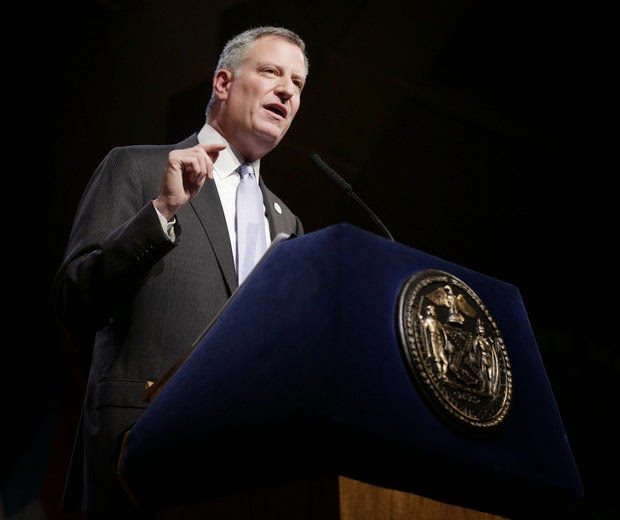NYC Mayor de Blasio First 100 Days
Mayor Bill de Blasio marked his first 100 days in office with an impassioned recounting of his populist values meant to re-energize his grassroots base and place his agenda within the framework of New York City's activist history.
De Blasio, the first Democratic mayor of the nation's largest city in a generation, delivered his address Thursday at Manhattan's Cooper Union, the same site where Abraham Lincoln gave an 1860 speech that became a launching pad for his presidential campaign. De Blasio did not shrink from the stage, connecting Lincoln and liberal heroes ranging from Robert F. Kennedy to the activists who began the gay rights movement at the Stonewall Inn, to his mission to fight the city's inequality gap.
"We weren't sent to City Hall to change New York's character, you sent us here to restore New York's proud legacy as the progressive city," de Blasio said. "We have to remember that the best and the brightest are born in every neighborhood, in every zip code. And what marks a just society is that it allows them all to reach their potential."
The mayor linked that quest to his signature campaign pledge, to create universal pre-kindergarten throughout the five boroughs. De Blasio fought to pay for the program with a tax hike on the wealthy, a plan that was defeated in Albany by fellow Democrat Gov. Andrew Cuomo and the state Legislature.
The program will instead be funded with money from the state budget, though de Blasio has made clear that he believes his relentless campaign on pre-k forced the governor to increase the money the city will receive. About 50,000 students will be in the program this fall, a number that increases to 73,000 in 2015.
"We weren't sent to City Hall to change New York's character, you sent us here to restore New York's proud legacy as the progressive city," Mayor Bill de Blasio said.
"We couldn't just help the few, we had to reach across the spectrum. We had to reach everyone," de Blasio said. "Pre-K is one of the best things we can do to launch kids on a successful educational career, and a successful life ahead."
He also, at times, abandoned his lofty rhetoric to remind the crowd that being mayor was not just about high-minded concepts like inequality, but also nitty-gritty daily responsibilities.
"I'd say nothing typifies the mundane work of government better than filling potholes," the mayor said. "You can tell the difference when the potholes has been filled and when it hasn't been."
He said the city had filled nearly 289,000 potholes during the first quarter of the year, up from 115,000 during the same period a year ago. He also, in a veiled swipe at his predecessor Michael Bloomberg, noted that a year ago residents in public housing had to wait, on average, 150 days for a basic repair. This year, the average wait time has been five days.
De Blasio, working from notes but not a prepared text, also touted a new law that expanded the number of paid sick days to workers throughout the city and his efforts to curb the NYPD tactic known as stop-and-frisk, which allows police to stop anyone deemed suspicious.
The mayor offered little in the way of new policy proposals during his nearly hour-long speech, but reiterated what his aides had previously outlined as the administration's goals for the remainder of the year: the beginning of an ambitious effort to create 200,000 new units of affordable housing; the creation of a health authority to help address a recent spate of hospital closings; the expensive retro-fitting of public housing to make them environmentally friendly; and the rebuilding of every home destroyed by Superstorm Sandy.
But the speech made no mention of perhaps the greatest challenge facing de Blasio, the expired labor contracts of all 150 municipal unions. Negotiations have begun with some of the unions, many of whom are asking for retroactive raises that could cost billions and endanger the rest of the mayor’s agenda.


Comments